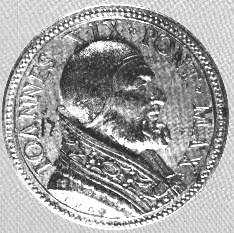 At Benedict's
death, his brother Romanus, the consul and senator of all the Romans, decided to
become pope. Though he was a layman, Romanus was elected. A little influence, a
little judicious spending, and the papacy was his.
At Benedict's
death, his brother Romanus, the consul and senator of all the Romans, decided to
become pope. Though he was a layman, Romanus was elected. A little influence, a
little judicious spending, and the papacy was his.
Disgruntled observers remarked that he was senator in the
morning and pope in the evening. And indeed there was a hurried conferring of
holy orders until sometime in April 1024, Romanus was consecrated pope as John
XIX. Though his accession to the papacy was, to say the least, somewhat
irregular, John did not make a bad pope. Unfortunately, however, he was not the
man his brother Benedict had been, nor was Conrad II the emperor that St. Henry
II had been. During this pontificate the cause of reform suffered a setback.
Conrad II, the first of the Salian emperors, came down into Italy in 1026 and
the next year proceeded to Rome for coronation. This was an unusually splendid
affair, graced as it was by the presence not only of the Pope and Emperor but of
King Canute of England and Denmark and King Rudolf of Burgundy. Conrad, an
energetic ruler, was too much occupied with consolidating his power to further
the cause of reform. Indeed, if anything, he impeded it by his appointments.
A curious incident occurred shortly after John became pope.
Envoys from the powerful Eastern Emperor Basil II arrived in Rome and with
golden arguments began to press the Pope to grant to the Patriarch of
Constantinople the title of Universal or Ecumenical Patriarch and recognize that
the Patriarch should have in the East the same jurisdiction the Pope had in the
whole world. News of this request spread rapidly, and Western public opinion
rose up against the ambition of Constantinople. Pope John, though he may have
been inclined to grant the request, finally refused it. The Easterners were
furious, and Pope John's name was stricken from their diptychs or liturgical
tablets.
Though John was not the fighter against abuses that his brother
had been, he did favor the Cluniac monks and grant privileges to monasteries.
Then too, he showed good sense in handling appeals. Indeed, in one case he
showed more than good sense; he showed true humility. Abbot William of St.
Benignus in Dijon wrote to the Pope scolding him for his lack of vigor in
carrying on the fight against simony. Pope John thanked him and praised the
outspoken monk for his zeal. John XIX did a little building. He also summoned to
Rome Guido of Arezzo, the famous monk who organized the do-re-mi scale. The Pope
encouraged the great music reformer and urged him to instruct the Roman clergy
in music.
John XIX died probably in October 1032. Though his method of
becoming pope was not above reproach, he had not done badly.
Excerpted from "Popes
Through the Ages" by Joseph Brusher, S.J.

